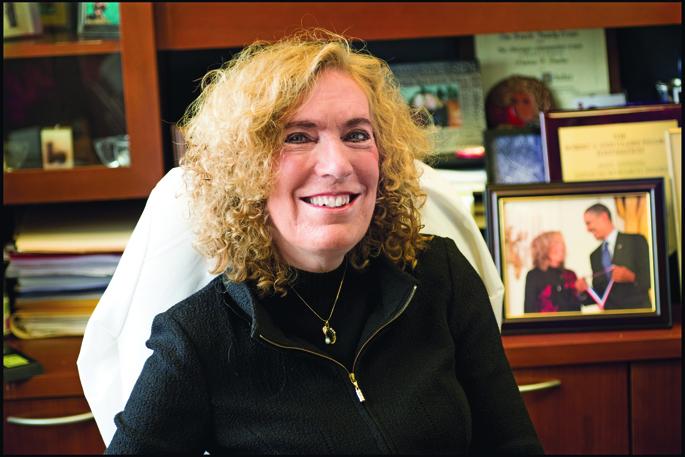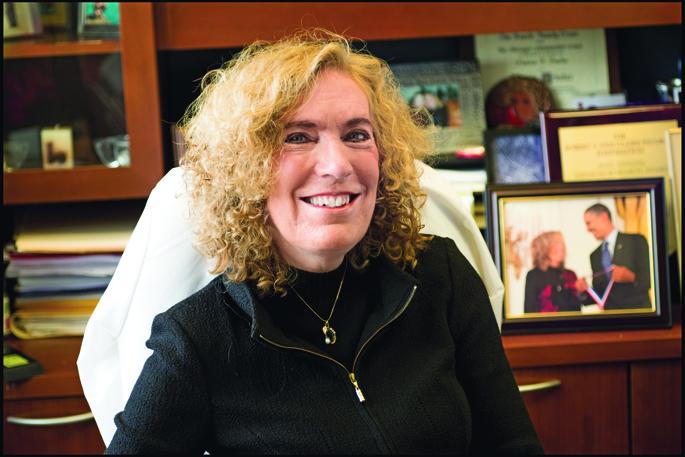
Credit: Mario Morgado/The Rockefeller University.
Elaine Fuchs, Ph.D., whose innovative use of reverse genetics has helped redefine the study of skin diseases and cancer stem cells, is the recipient of the 2016 Vanderbilt Prize in Biomedical Science, officials at Vanderbilt University Medical Center (VUMC) announced today.
Fuchs is the Rebecca C. Lancefield Professor and head of the Robin Chemers Neustein Laboratory of Mammalian Cell Biology and Development at Rockefeller University in New York, and, since 1988, a Howard Hughes Medical Institute (HHMI) investigator.
She is the 11th recipient of the Vanderbilt Prize in Biomedical Science. Established by Vanderbilt University School of Medicine in 2006, the competitive prize honors women scientists with a "stellar record" of research accomplishments who have made significant contributions to mentoring other women in science.
Prize winners receive an honorarium, meet with Vanderbilt faculty and deliver a Flexner Discovery Lecture. They also mentor Vanderbilt Prize Scholars, women who are pursuing graduate studies in the biomedical sciences in the School of Medicine.
Fuchs will receive the prize on March, 30, 2017, when she is scheduled to give a Flexner Discovery Lecture.
"Dr. Fuchs is a world leader in stem cell research and pioneered the approach of reverse genetics to decipher human diseases. In addition to her many contributions to our understanding of genetic diseases of the skin, she is an inspiring researcher who is a passionate mentor and advocate for careers in science for women," said Jeff Balser, M.D., Ph.D., President and CEO of Vanderbilt University Medical Center, and Dean of the Vanderbilt University School of Medicine. "I want to congratulate her as the recipient of this year's prize."
Fuchs grew up in a suburb of Chicago, majored in Chemistry at the University of Illinois, and earned her Ph.D. in Biochemistry from Princeton University. As a postdoctoral fellow in the lab of the late Howard Green, M.D., at MIT, she studied the growth and differentiation of epidermal keratinocytes.
Her work there demonstrated that keratins – the fibrous structural proteins that protect epithelial cells from mechanical stress – were likely distinct proteins coming from different genes that were differentially expressed.
In 1980, Fuchs was recruited by the University of Chicago as the first woman faculty member in Biochemistry. There she was mentored by the late Janet Rowley, M.D., and Susan Lindquist, Ph.D., winner of the 2014 Vanderbilt Prize in Biomedical Science, who died last month.
Fuchs' lab immediately set about to clone and sequence various keratin genes. It employed a reverse genetics approach, transgenic mice that expressed mutant genes, to elucidate the function of the normal keratin proteins.
One mutation resulted in a disease that resembled epidermolysis bullosa simplex (EBS), a human skin disease characterized by severe blistering. Skin biopsies from EBS patients confirmed that the disease resulted from keratin mutations.
While at the University of Chicago, Fuchs began studies that led to her current focus – how multipotent stem cells of mammalian skin give rise to the epidermis and hair follicles. After moving to Rockefeller University in 2002, her team developed a way to fluorescently tag these slow-proliferating cells.
The approach yielded insights into normal tissue formation and wound repair, and malignant transformation as well. In 2011, her lab defined how stem cells can acquire mutations that go on to initiate squamous cell carcinoma, a type of skin cancer.
Fuchs has received numerous honors for her scientific achievements, including the National Medal of Science from the National Science Foundation and the E.B. Wilson Medal from the American Society for Cell Biology. She is a member of the National Academy of Sciences and the American Academy of Arts and Sciences.
In 2010 she received the L'Oréal-UNESCO Award in the Life Sciences. The award recognizes outstanding women scientists who also have been a source of support, motivation and inspiration for other women in science.
###
For a complete list of Vanderbilt Prize winners, go to https://medschool.vanderbilt.edu/dean and click on "Vanderbilt Prize."
Media Contact
Craig Boerner
[email protected]
615-322-4747
http://www.mc.vanderbilt.edu/npa
############
Story Source: Materials provided by Scienmag




